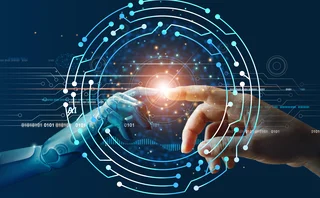AI a Go
The Google-developed AI program AlphaGo mastered what was considered to be the toughest board game for AI to crack, Go.

In October, a major breakthrough occurred in the world of artificial intelligence ─ a computer bested a human in the 2,500-year-old Chinese board game, Go. The findings from that contest were released this week in the scientific journal Nature.
Google researchers in England developed the program ─ AlphaGo ─ and pitted it against European Go champion Fan Hui. They played five formal games (which have longer time controls) and five informal games (which have shorter time controls). AlphaGo won the formal game 5-0, and bested Hui in the informal games 3-2.
This is a breakthrough because Go is considered incredibly complex. While a game like chess features on average 20 possible moves, Go has about 200. "The game of Go has long been viewed as the most challenging of classic games for artificial intelligence owing to its enormous search space and the difficulty of evaluating board positions and moves," according to the research paper.
The researchers used value networks to evaluate board positions and policy networks to select moves; Monte Carlo tree search programs that simulate thousands of random games of self-play; and they introduced a new search algorithm that combines Monte Carlo simulation with value and policy networks.
While computers have dominated in games like chess, checkers and othello, researchers thought that they were still "at least a decade away" from beating the full-sized, formal game of Go. Perhaps what was most impressive was that AlphaGo "intelligently" used its computations. Rather than simply running simulations on a massive amount of possible position moves ─ the way that IBM's supercomputer Deep Blue defeated chess grandmaster Garry Kasparov ─ it was able to cut down on the number of positions to a handful of "intelligent" moves.
From the report:
During the match against Fan Hui, AlphaGo evaluated thousands of times fewer positions than Deep Blue did in its chess match against Kasparov; compensating by selecting those positions more intelligently, using the policy network, and evaluating them more precisely, using the value network-an approach that is perhaps closer to how humans play. Furthermore, while Deep Blue relied on a handcrafted evaluation function, the neural networks of AlphaGo are trained directly from gameplay purely through general-purpose supervised and reinforcement learning methods.
The Week in AI
Earlier this year I wrote that for 2016, artificial intelligence (and the subset of machine learning) would be one of the three biggest areas of interest in the capital markets space.
Sure enough, just this week we had three stories looking at the area. Portware's Henri Waelbroeck talked about the ways that AI is proving most useful when it comes to institutional trading, and where there are still limits. ITRS CTO Justo Ruiz-Ferrer discussed how machine learning is helping the company to better understand customer needs. And analytics software provider Recognos Financial launched a machine learning data extraction service.
For the March issue of Waters I'm working on a feature looking at how machine learning is helping to develop very specific trading strategies. I'm happy to discuss more. Call me at 646-490-3973 or shoot me an email to anthony.malakian@incisivemedia.com.
But the point is that AI is rapidly growing. This will create new opportunities for firms, and it will also create new nightmares. The developers at Google thought they were a decade away from toppling Go...and then it was mastered.
The deep neural networks used by AlphaGo could prove to be revolutionary in helping traders to weed out the noise when it comes to analyzing trading data and movements. Maybe we're a decade away from a major breakthrough in the capital markets. Or maybe it's right around the corner.
But I'll bet one thing: if developers at a hedge fund crack the code, they won't go out publishing their results in Natrue magazine. In fact, we may never hear about it. Who knows...maybe the AI super-machine is already out there, besting investors.
Only users who have a paid subscription or are part of a corporate subscription are able to print or copy content.
To access these options, along with all other subscription benefits, please contact info@waterstechnology.com or view our subscription options here: http://subscriptions.waterstechnology.com/subscribe
You are currently unable to print this content. Please contact info@waterstechnology.com to find out more.
You are currently unable to copy this content. Please contact info@waterstechnology.com to find out more.
Copyright Infopro Digital Limited. All rights reserved.
As outlined in our terms and conditions, https://www.infopro-digital.com/terms-and-conditions/subscriptions/ (point 2.4), printing is limited to a single copy.
If you would like to purchase additional rights please email info@waterstechnology.com
Copyright Infopro Digital Limited. All rights reserved.
You may share this content using our article tools. As outlined in our terms and conditions, https://www.infopro-digital.com/terms-and-conditions/subscriptions/ (clause 2.4), an Authorised User may only make one copy of the materials for their own personal use. You must also comply with the restrictions in clause 2.5.
If you would like to purchase additional rights please email info@waterstechnology.com
More on Emerging Technologies
BlackRock tests ‘quantum cognition’ AI for high-yield bond picks
The proof of concept uses the Qognitive machine learning model to find liquid substitutes for hard-to-trade securities.
JP Morgan, Eurex push for DLT-driven collateral management
The high-stakes project could be a litmus test for the use of blockchain technology in the capital markets.
For AI’s magic hammer, every problem becomes a nail
A survey by Risk.net finds that banks are embracing a twin-track approach to AI in the front office: productivity tools today; transformation tomorrow.
On GenAI, Citi moves from firm-wide ban to internal roll-out
The bank adopted three specific inward-facing use cases with a unified framework behind them.
How a Chinese AI firm shook the tech world
DeepSeek’s AI model is the very ethos of doing what you can with what you have.
To unlock $40T private markets, Hamilton Lane embraced automation
In search of greater transparency and higher quality data, asset managers are taking a tech-first approach to resource gathering in an area that has major data problems.
Waters Wavelength Ep. 304: Nice Actimize’s Lee Garf
Lee joins to discuss changes in communication platforms over the last few years.
DTCC revamps data distribution, collection efforts with cloud, AI
The US clearinghouse is evaluating the possibilities that cloud and AI offer to streamline the processes by which it collects and makes data available to market participants.








